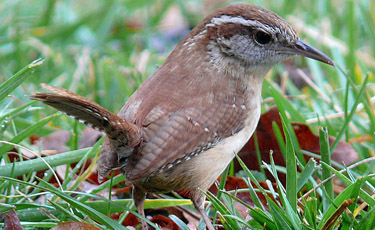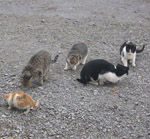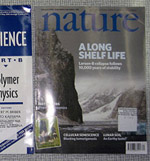Study links mercury contamination with changes in birdsongs
 Birds
Birds  A Carolina wren (Thryothorus ludovicianus). Image credit, Ken Thomas.A new study in the journal Auk finds evidence that mercury contamination can modify the singing behavior of birds.
A Carolina wren (Thryothorus ludovicianus). Image credit, Ken Thomas.A new study in the journal Auk finds evidence that mercury contamination can modify the singing behavior of birds.
Kelly Hallinger and fellow researchers from William and Mary's Cristol Lab recorded and analyzed bird songs from four species at sites along the mercury-contaminated South River in Virginia. They also studied birds of the same species at nearby uncontaminated sites.
The researchers found that for three of the species - the Carolina wren, house wren, and song sparrow - songs at the contaminated sites contained a lower diversity of note types and were sung at lower tonal frequencies. Furthermore, both species of wren tended to sing shorter songs at the polluted sites.
These behavior changes could have negative consequences for avian populations. The study authors write:
"Because song plays a critical role in both mate attraction and territory defense, contaminant-induced changes… could severely depress male reproductive success. Song is therefore a potent mechanism through which contaminants such as mercury could affect fitness."
The study offers several possible explanations for the differences in birdsongs at mercury-contaminated sites:
1) Mercury contaminated birds may suffer impairment in hearing high frequencies which in turn could cause them to preferentially sing lower notes - similar auditory impairment has been found in monkeys exposed to mercury.
2) Mercury could cause stress during song learning. This would make sense given that the fourth species examined in the study, the eastern phoebe, did not exhibit differences in singing at the contaminated and reference sites. Unlike the other three birds, scientists believe that the phoebe does not learn songs but rather is predisposed to sing certain patterns.
3) Contaminated birds might be in poorer condition and therefore sing in a way that is easier for them to perform.
4) Other factors incidentally associated with the contaminated site could be causing the differences. However, the authors do not believe that this is the case. They collected data on surrounding land cover and found no difference between contaminated and reference sites.
This study adds to the growing body of work showing that environmental contaminants can have sub-lethal negative impacts for species. On the positive side, the findings indicate that if we listen closely enough, bird songs may give us a heads-up, warning about contamination issues in a particular area. The researchers write,
"Song may be a more sensitive indicator of environmental stress than tissue samples, which are traditionally used to evaluate contaminant effects, because song is the result of a combination of complex behavioral and physiological pathways."
--Reviewed by Rob Goldstein
Hallinger, K., Zabransky, D., Kazmer, K., & Cristol, D. (2010). Birdsong Differs between Mercury-polluted and Reference Sites The Auk, 127 (1), 156-161 DOI: 10.1525/auk.2009.09058




Reader Comments